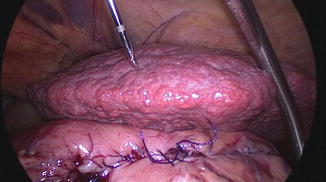Fig. 3.1
Morbidly obese patient (BMI71)
In addition, since surgical treatment is occasionally related to postoperative complications, it is important to deal with these as well. However, in morbidly obese individuals, treating these postoperative complications is not easy as in nonobese patients because of their physical and functional differences. In this chapter, the reasons why bariatric procedures are risky will be described.
3.2 Comorbidities in Patients with Morbid Obesity
Morbid obesity is a potentially deadly situation that is a harbinger of multiple diseases and disorders, affecting every organ and system of the human body (Table 3.1). Several of these problems are described in detail below.
Table 3.1
Comorbid medical conditions associated with morbid obesity
Cardiovascular |
Hypertension |
Congestive heart failure |
Prolonged QT |
Venous stasis |
Deep venous thrombosis |
Pulmonary hypertension |
Pulmonary |
Obstructive sleep apnea |
Asthma |
Hypoventilation syndrome |
Metabolic |
Type II diabetes |
Hyperlipidemia |
Hypercholesterolemia |
Gastrointestinal |
Gastroesophageal reflux |
Choleolithiasis |
Non-alcoholic steatotic hepatitis (NASH) |
Psychiatric |
Depression |
3.2.1 Cardiovascular Problems
Cardiovascular dysfunction is commonly seen in morbidly obese patients and is manifested as hypertension and coronary artery disease. Heart failure may be the consequence of left or right ventricular hypertrophy secondary to hypertension. In addition, prolonged QT and sudden death syndrome occur more commonly in patients who are morbidly obese than in those who are not. Other cardiovascular problems include arrhythmia, ischemic stroke, and deep vein thrombosis with or without pulmonary embolus.
3.2.2 Respiratory Insufficiency
Respiratory insufficiency in patients with morbid obesity is associated with obstructive sleep apnea syndrome and obesity-hypoventilation syndrome. In these patients, abnormalities in respiratory function tests and arterial blood gas analyses can be seen. These abnormalities may cause systemic hypertension, pulmonary hypertension and cor pulmonale. In addition, obstructive sleep apnea may cause acute respiratory arrest and other life-threatening events.
3.2.3 Metabolic Complications
The relationship between central obesity and the constellation of health problems such as hypertension, hyperglycemia, and hyperlipidemia, known as “metabolic syndrome,” is well established. It is thought that the increase of visceral fat causes insulin resistance, which subsequently causes hyperglycemia and hyperinsulinemia and finally leads to the development of type 2 diabetes mellitus. It has also been established that such conditions are responsible for nonalcoholic steatohepatitis (NASH), which can progress to liver cirrhosis (Fig. 3.2). Bariatric surgeons should also pay attention to the presence of renal dysfunction or failure secondary to type 2 diabetes. In the perioperative period, poor glycemic control can cause postoperative mortality secondary to comorbidities such as leakage at the site of gastrointestinal anastomosis, delayed wound healing, and surgical site infection. Other possible metabolic complications include hypertension, hyperlipidemia, and the formation of gall stones.


Fig. 3.2
Liver cirrhosis secondary to NASH in morbidly obese patient
3.2.4 Other Comorbid Conditions
In patients who are morbidly obese, chronic lower limb venous stasis and hypercoagulability are often observed. These conditions may increase the risk of deep venous thrombosis and pulmonary embolus, which accounts for nearly half of the perioperative mortality due to bariatric surgery.
3.3 Issues Related to Anesthesia and Analgesia
Stay updated, free articles. Join our Telegram channel

Full access? Get Clinical Tree







